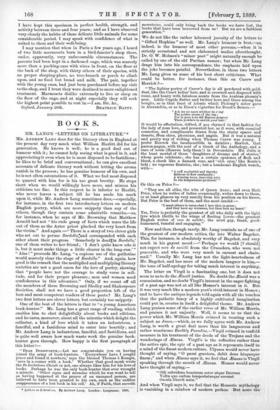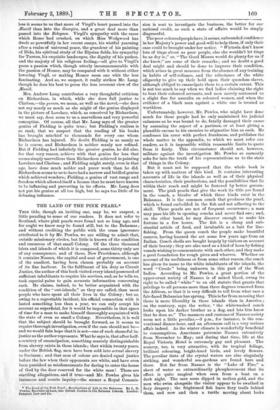BOOKS.
the present. day very much what William Hazlitt did for his generation. He knows it well; he is a good deal out of humour with it; he cannot help seeing what is good in it, and appreciating it even when he is most disposed to be fastidious ; he likes to be brief and conversational ; he can give excellent
accounts of delicate literary work without letting the aroma vanish in the process ; he has genuine humour of his own, and he is not often ostentatious of it. What we feel most disposed to quarrel with him for is his too great brevity. He stops short when we would willingly have more, and minces his criticism too fine. In this respect he is inferior to Hazlitt, who never leaves a subject till he has made his mark upon it, while Mr. Andrew Lang sometimes does,—especially, for instance, in the first two introductory letters on modern English poetry, which are more snippety than any of the others, though they contain some admirable remarks,—as, for instance, when he says of Mr. Browning that Matthew Arnold had not "his rude grasp of facts which tears the life out of them as the Aztec priest plucked the very heart from the victim." And again :—" There is a story of two clever girls
who set out to peruse Sordello,!and corresponded with each other about their progress. Somebody is deadlin Bordello,' one of them writes to her friend ; I don't quite know who it is, but it must make things a little clearer in the long-run." " Alas !" proceeds Mr. Lang, "a copious use of the guillotine would scarcely clear the stage of Bordello?' And, again, how good is the remark that the multiplied and multiplying literary
societies are not a good omen for the love of poetry, showing that "people have not the courage to study verse in soli- tude, and for their proper pleasure ; men and women need confederates in this adventure." Only, if we count off all the members of these Browning and Shelley and Shakespeare Societies, shall not we have a good proportion left of the best and most competent readers of these poets P Mr. Lang's two first letters are clever letters, but certainly too snippety. One of the best of the letters is that to "a young American book-hunter." Mr. Lang has a great range of reading, which enables him to chat delightfully about books and editions, and he cares, moreover, about all the minathe which delight the collector, a kind of lore which it takes an industrious, a fanciful, and a fastidious mind to enter into heartily ; and Mr. Andrew Lang is industrious, fanciful, and fastidious, and is quite well aware how much waste work the genuine book-
hunter goes through. How happy is the first paragraph of this letter !— " DEAR DODSWORTH,—Let me congratulate you on having joined the army of book-hunters. Everywhere have I sought peace and found it nowhere,' says the blessed Thomas a Kempis, 'save in a corner with a book.' Whether that good monk wrote the De Imitations Christi or not, one always likes him for his love of books. Perhaps he was the only book-hunter that ever wrought a miracle. Other signs and miracles which he was wont to tell as having happened at the prayer of an unnamed person, are believed to have been granted to his own, such as the sudden reappearance of a lost book in his cell.' Ah, if Faith, that moveth
• .Lettcrs on L■terat ire. By Andrew Lang. London Lougmans. 1889,
mountains, could only bring back the books we Shave lost, the books that have been borrowed from us ! But we are a faithless generation."
We do not like the rather laboured jocosity of the letters to "Gifted Hopkins" so well. Mr. Lang's humour is best,—as, indeed, is the humour of most other persons,—when it is strictly occasional and not elaborated malice aforethought. Dr. 0. W. Holmes's "minor poet" might naturally enough be called by one of the old Puritan names ; but when Mr. Lang drags him into his correspondence, the emphasis laid upon the joke becomes painful. Nevertheless, in these two letters Mr. Lang gives us some of his best short criticisms. What could be better, for instance, than this on Carew and Herrick P-
" The lighter poetry of Carew's day is all powdered with gold- dust, like the Court ladies' hair, and is crowned and diapered with roses, and heavy with fabulous scents from the Arabian phcenix's nest. Little Cupids flutter and twitter here and there among the boughs, as in that feast of Adonis which Ptolemy's sister gave in Alexandria, or as in Eisen's vignettes for Dorat's Baisers A.k me no more whither do Wray The golden atoms of the day ; For In pure love did Heaven prepare These powders to enrich your hair.'
It would be affectation, Gifted, if you rhymed in that fashion for the lady of your love, and presented her, as it were, with comical cosmetics, and compliments drawn from the starry spaces and deserts, Mom skies, phcenixes, and angels. But it was a natural and pretty way of writing when Thomas Carew was young. I prefer Herrick the inexhaustible in dainties ; Herrick, that parson-pagan, with the soul of a Greek of the Anthology, and a cure of souls (Heaven help them !) in Devonshire. His Julia is the least mortal of these daughters of dreams and of stories,' whom poets celebrate; she has a certain opulence of flesh and blood, a cheek like a damask rose, and rich eyes,' like Keats's. lady ; no vaporous Beatrice, she ; but a handsome English wench,. with-
' A cuff neglectful and thereby Ribbons to flow confusedly A winning wave, deserving noie In the tempestuous petticoat.'"
Or this on Prior ?—
" They are all alike, the wits of Queen Anne ; and even Matt. Prior, when he writes of ladies occasionally, writes down to them, or at least glances up very saucily from his position on his knees.. But Prior is the best of them, and the most candid :- 'I
court others in verse—but I love thee in prose ;
And they have my whimsies, but thou hast my heart.'
Yes, Prior is probably the greatest of all who daily with the light lyre which thrills to the wings of fleeting Loves—the greatest English writer of vers tie soda ; the most gay, frank, good- humoured, tuneful and engaging."
Now and then, though rarely, Mr. Lang reminds us of one of the greatest of our modern critics, the late Walter Bagehot. This, for instance, is absolutely worthy of Bagehot, and very
much in his gayest mood :—" Perhaps we would [P should] not expect vers de societg from the Crusaders, who were not peaceable, and who were very much in earnest and chain- mail." Usually Mr. Lang has not the light-heartedness of Mr. Bagehot, and has more of the modern languor in him,—
the tone of half-apology for taking much interest in anything..
The letter on Virgil is a fascinating one, but it does not seem tons to do the 2Bneid justice. No doubt the 20neid was a commission, and no doubt Virgil's interest in the eager fighting of a past age was not at all like Homer's interest in it. But. it was very much like a modern poet's vivid interest in Homer; and to have the antique legends told again with all the touches that the pathetic fancy of a highly cultivated imagination could put in, creates in itself a delightful theme. Mr. Andrew Lang praises some of the earlier verse of Mr. William Morris, and praises it not unjustly. Well, it seems to us that the- power which Mr. William Morris evinced in treating such a subject as Jason,—which, as we fully agree with Mr. Andrew- Lang, is worth a great deal more than his languorous and rather wearisome Earthly Paradise,—Virgil evinced in tenfold measure in his treatment of the deeds of the Trojans and the- wanderings of ..Eneas. Virgil's is the reflective rather than
the active epic, the epic of a past age as it represents itself to. a mind of the finest modern culture. Ulysses would never have- thought of saying, "0 passi graviora, dabit dens hisquoque- fmem ;" and when .ZEneas says it, we feel that 2Eneas is Virgil speaking through the mouth of 2Eneas. Homer would never have thought of saying,—
" 011i subridens hominum sator atque Deorum Volta quo ccelum tempestatesque serenat Oscula libavit natie."
And when Virgil says it, we feel that the Homeric mythology is vanishing in a rainbow of modern pathos. But none the less-it seems to us that more of Virgil's heart passed into the .,Eneid than into the Georgics, and a great deal more than passed into the Eclogues. Virgirs sympathy with the races which Rome had crushed, on which Miss Wedgwood has dwelt so powerfully in her recent essays, his wistful yearning after a realm of universal peace, the grandeur of his painting of Dido, his spiritual study of the Elysian fields, his sympathy for Turnus, his exquisite landscapes, the dignity of his pathos, and the majesty of his religious feeling,—all give to Virgirs poem a passion which, though utterly incommensurable with the passion of Homer, may be compared with it without either lowering Virgil, or making Homer seem one whit the less fascinating. And so, we suspect, it really strikes Mr. Lang, though he does his best to press the less reverent view of the Mrs. Andrew Lang contributes a very thoughtful criticism on Richardson, in which, while she does full justice to Clarissa,—the person, we mean, as well as the novel,—she does not say nearly as much as she might of the genius displayed in the picture of Lovelace, which, as conceived by Richardson, we must say, does seem to us a marvellous and very powerful conception. Of course, all that Mr. Lang says of the greater genius of Fielding is quite true ; but Fielding's realism is so rank, that we suspect that the reading of his books has brought mischief to thousands for every one whom Richardson has injured. No doubt Fielding is as manly as he is coarse, and Richardson is neither manly nor refined. But if Fielding had infinitely the greater genius, he did also, for that very reason, achieve with that genius far less that seems simply marvellous than Richardson achieved in painting Lovelace and Clarissa ; and Fielding might surely, even in that age, have done much nobler and purer work than he did. Richardson seems to us to have had a narrow and bridled genius which achieved wonders; Fielding, a genius of vast range and freedom which allowed itself a license that he must have known to be inflaming and perverting in its effects. Mr. Lang does not put his genius at all too high, but he says too little of its debasing influence.



































 Previous page
Previous page